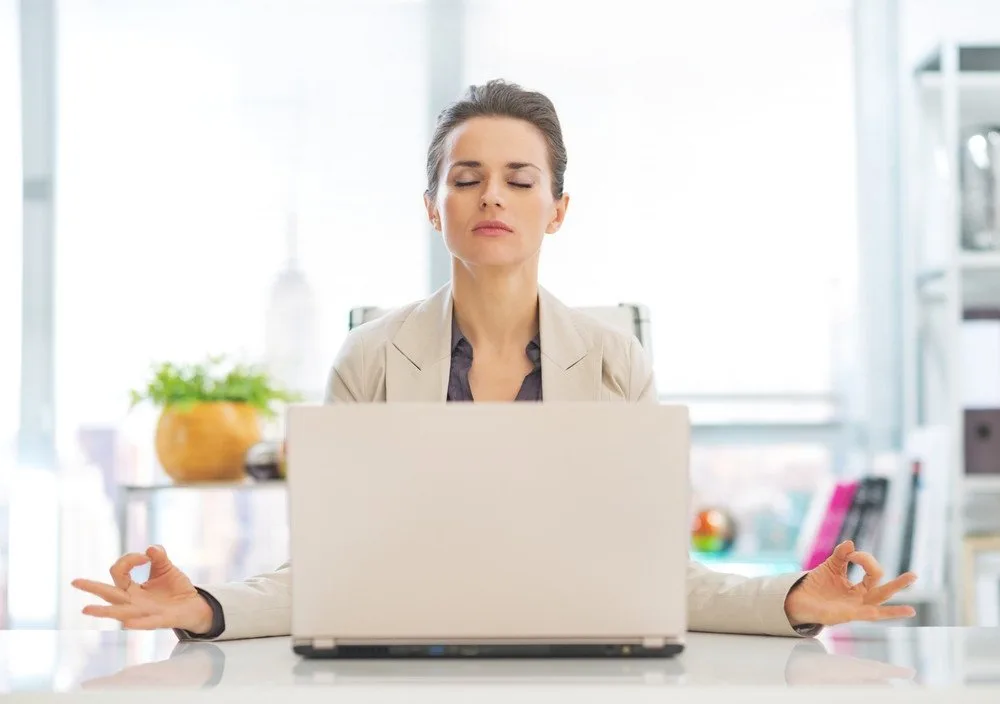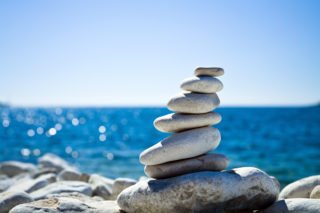Meditation has many different forms and can be beneficial for a number of reasons for people of all ages. It’s defined as using a technique such as mindfulness or personal insight to focus on a particular object, goal, or part of the body. Meditation focuses on training attention to a specific thing in order to create a clear and calm state of mind. You can practice it for as short or long as you need to. No matter the time frame, it has outstanding benefits for a person’s overall wellbeing.
Meditation techniques have been derived and inspired by ancient Buddhist practices. Thousands of years ago, people used meditation as a way to practice mindfulness and mental clarity. Now, in 2020, people are incorporating it into their everyday lives in order to improve their overall health and wellbeing. People are learning how to meditate in yoga classes, with apps, and even with podcasts. In fact, meditation is so important in modern-day life that people are making it a point to practice meditation during the COVID-19 pandemic.
The practice is known to reduce stress and anxiety. Especially now, these are emotions that are extremely prominent during the global pandemic. People all over the world – young and old – are feeling overwhelmed, stressed, and afraid during these trying times. They are experiencing these unsettling emotions for many reasons, including the fear of the virus itself, the possibility that they may lose their job, or the discomfort of staying at home for almost two months. As the world is forced into social distancing, there are very few options for people to escape their emotions. However, with meditation, they can effectively do so.
Below is what you need to know about meditation and how it can help you or a loved one during the COVID-19 pandemic.
The Kinds of Meditation 
If you are unfamiliar with meditation and are looking to incorporate it into your life, it’s important that you know the various kinds of meditation. Depending on the kind of meditation, there will be different things that will benefit from it. For example, if you are practicing meditation in a yoga studio, you are likely practicing Zen meditation and the purpose is to create mental clarity in order to destress your mind. Or, if you are practicing progressive relaxation meditation, you are likely trying to overcome a muscle ache, or get over an injury.
Here are the most common kinds of meditation and a brief explanation of each:
1. Metta Meditation
This kind of meditation is designed to offer insight into yourself. In other words, metta meditation aims to create an attitude of love and kindness towards all things, including oneself. As the person sits with eyes closed and practices deep breathing, he or she must focus on ideals of love and kindness. To focus on these, the person must think about what brings love and kindness into his or her life. After focusing on these things for an extended period, the idea is that the person will be able to cultivate love and kindness into everyday life.
2. Progressive Relaxation
This kind of meditation requires a person to relax, and focus on physical areas of discomfort or tension. Focusing on a specific area of pain will allow the body to relax those muscles since their entire attention will be focused on the area. It’s recommended that the person imagines a wave going over the body. Start at the feet and go over the rest of the body. This technique will relax muscle groups, relieving pain. Progressive relaxation meditation is especially beneficial for individuals that are suffering from chronic pain.
3. Transcendental Meditation
Transcendental meditation is the most common spiritual practice. It requires people to sit still and breathe slowly. Usually this kind of meditation is done with a teacher. In 2020, many people are using apps and podcasts that repeat certain words or mantras that will promote enlightenment and wellness. The idea of transcendental meditation is to rise above one’s body to gain insight into the world and oneself.
4. Zen Meditation 
One of the oldest forms of Buddhist meditation, Zen meditation requires one to do certain postures and breathing techniques while focusing and paying attention to one’s thoughts as they come. One must make it a point not to judge the thoughts that he or she is noticing as this is part of the path to enlightenment.
Zen practice is great for relaxation and for those that are trying to become more spiritual. People typically practice Zen meditation before bed or in a yoga studio.
5. Kundalini Yoga
Yoga incorporates meditation in many practices. However, Kundalini yoga is a form of yoga that is entirely based on meditation. Kundalini yoga is an active form of meditation that uses movements and breathing techniques to improve mental health as well as chronic pain. Usually done with a teacher who is repeating mantras, Kundalini yoga has been proven to treat physical and emotional pain such as:
- Anxiety
- depression
- stress
- Back Pain
- joint pain
- muscle discomfort
Because Kundalini yoga requires one to use his or her strength during meditation, this kind of meditation can also strengthen one’s body, therefore benefiting the body just as much as the mind.
The Benefits of Meditation 
There are copious benefits that this practice has to offer. Not only does meditation help a person mentally, it also can improve emotions as well as one’s physical health. Whether you are young or old, you can get something out of learning how to properly meditate.
Because this practice is so popular, it is becoming more accessible to people. Colleges and high schools are beginning to offer it to students, and town centers and office buildings are incorporating weekly classes into their schedules. Likewise, more yoga studios that offer meditation classes are popping up. In fact, a senior living community in NJ offers meditation and yoga classes to its residents because of the outstanding benefits that it has to offer to the elderly community.
It’s important to recognize the benefits of meditation. Especially now as the world is faced with trying times of the COVID-19 pandemic.
Meditation During the COVID-19 Pandemic
While the practice is always beneficial, it can be especially beneficial now, during the COVID-19 pandemic. People all over the world are forced to practice social distancing. They also have no choice but to stay in the comfort of their homes. As a result, many people are feeling extreme anxiousness, stress, and fear. These emotions are common. Even for those that may not have ever suffered from any sort of emotional or mental issue before.
The COVID-19 pandemic is unlike anything the world has ever seen before. It is taking a definite toll on people’s mental, emotional, and even physical health. People are on an emotional rollercoaster due to COVID-19. People are losing their jobs because of the need to quarantine. Others are struggling to get unemployment, and some are suffering or losing loved ones to this virus. With these hardships comes mental and emotional distress that very few things can treat, especially while stuck at home.
However, there is one way that one can overcome these unwanted emotions, and this is through meditation. Because it can be done right at home and can be learned through watching videos, reading books, or even using apps, one can start meditating right away with minimal effort. As long as one has a quiet space at home, he or she is ready to start meditating.
If you are feeling stressed, anxious, or maybe even bored, meditating may be for you. Here are the major benefits of the practice during the COVID-19 pandemic.
1. Improved Sense of Self 
Many people begin practicing meditation in order to overcome some sort of mental or emotional obstacle. Perhaps they are often stressed at work, or they are battling a traumatic life event. Meditation offers a way for a person to escape and focus the mind on something else. It doesn’t matter if you meditate for an hour a day, five minutes before bed, or even only once a week. Your mental health will likely improve. Not only that, but you can also have an improved sense of self.
This is especially important during these uncertain times. It’s likely that your sense of self is not at a particularly high right now with the current state of the world. The practice will allow you to focus on your own mental health in a positive way.
2. Healthier Bodies
It can help one’s body just as much as it can help one’s mind. Certain kinds of meditation (see above) require physical activity which will improve strength, keeping the body strong while stuck at home. Or, if you have an area of discomfort, meditation will allow you to do what you can now as you are stuck at home, to fix the injury or area of tension.
Keeping one’s body physically healthy while in quarantine will make a person feel good not only physically, but also mentally.
3. Sense of Control
The COVID-19 pandemic has made people feel as if they are not in control and that no matter what they do, they can’t catch a break. A way to gain a sense of control in one’s life during these uncertain and stressful times is to practice meditation. Since meditation focuses on one’s thoughts so intensely, one can control those thoughts and learn how to calm down the unpleasant thoughts that lead to stress and anxiety.
Controlling your mental and emotional health is crucial right now. As there are very few things that you can control right now, your personal well being should be one thing that you work on. Click on the link to find out what former monk Jay Shetty has to say about relaxing during isolation.
The Importance of Meditation During the COVID-19 Pandemic
Meditation can help a lot of things in the human body. From improving a person’s mood to helping a person overcome something tragic, the practice can work wonders. It’s something extraordinary in and of itself. However, it has the potential to be even greater during the global pandemic. As the entire world is forced to stay home for an indefinite amount of time, it is an important thing to learn how to do and focus on getting good at. It will keep you occupied and will help your overall health and wellbeing, making the COVID-19 pandemic a little less challenging.
Who is the author?
 Jennifer Bell is a freelance writer, blogger, dog-enthusiast and avid beachgoer operating out of Southern New Jersey. After college, she worked as an intern for a publishing company in Manhattan before getting a job as an editorial writer for a news agency in Philadelphia. Jennifer Bell now lives and works in Southern New Jersey as a freelance writer in order to have the freedom to travel as she pleases. She hopes to get her MFA in Creative Writing in the future and eventually become a fiction author or English professor.
Jennifer Bell is a freelance writer, blogger, dog-enthusiast and avid beachgoer operating out of Southern New Jersey. After college, she worked as an intern for a publishing company in Manhattan before getting a job as an editorial writer for a news agency in Philadelphia. Jennifer Bell now lives and works in Southern New Jersey as a freelance writer in order to have the freedom to travel as she pleases. She hopes to get her MFA in Creative Writing in the future and eventually become a fiction author or English professor.






![women [longevity live]](https://longevitylive.com/wp-content/uploads/2020/01/photo-of-women-walking-down-the-street-1116984-100x100.jpg)










